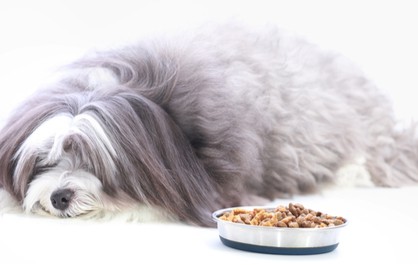My dogs have been eating a raw diet for more than 20 years. I’ve learned a lot in the past 20 years, and my raw diet for my dogs today is different from what it was 20 or even 5 years ago.
The removal of chicken and other poultry from my dogs’ raw food is one of the biggest changes. I used to love how cheap and accessible chicken was when I first started feeding raw, but I now believe it’s preferable to avoid it entirely and spend more money on other meats.
Yes, dogs can eat raw chicken, and many of them do. However, giving your dog raw chicken is not the best protein option. Because consuming chicken and most other poultry results in two very serious nutritional issues that can harm dogs’ health
I realize that’s a contentious claim, but hold on before you start stressing about the expense of removing chicken from your dog’s raw diet. I’ll tell you why I no longer feed chicken. But I’ll also demonstrate some workarounds to make poultry less harmful for the health of your dog.
But first, I want to discuss what makes chicken unique from other protein sources before I discuss the nutritional pitfalls of chicken.
They May Be a Picky Eater and Prefer Chicken

Small breeds tend to be picky eaters. This can be a problem if your remedy is to feed ‘people’ food like poached or shredded chicken, and they get so used to it, it’s all they eat.
Reintroduce balanced, high-quality dog food, and make sure they consume it consistently.
Dog food can be pricey, but buy the highest-quality brand you can. Some store bought dog foods can be bland and unappealing. It’s best to buy the best variety you can manage. Your dog is probably holding out for their chicken if they refuse to eat it.
When they realize they won’t be getting anything else, the majority of dogs will give in.
If good pet food is too expensive for you, you can make your own. Simply boil a whole chicken or pieces of chicken. Remove cooked meat from the bones and add vegetables and rice, and any dog specific supplements.
Over time, experiment with using any meat that is on sale, such as pork, lamb, or beef.
Human-made canned meat should be avoided because it may contain a lot of salt.
Due to the risk of salmonella or bacterial infections, most sources advise against eating raw chicken, though there is an increasing trend toward eating raw food, including raw chicken and raw chicken bones. However, if you’re unsure about raw food diets, any plain roasted, poached, grilled, or baked chicken can be given to your dog as a treat or combined with regular food. For a special homemade dinner, you can even combine it with a nutritious grain and a vegetable like string beans or another vegetable safe for dogs.
Is Chicken Easy for Dogs to Digest?
Chicken is one of the easier meats for your dog’s stomach to digest when compared to many other types of meat. But not all chicken cuts are as simple to digest as others. Stick with boneless, skinless chicken breasts that have been fully cooked to make things simpler for your canine companion.
Because chicken contains less fat than other meats, it is easier on your dog’s digestive system, allowing him to eat high-protein meat every day without discomfort.
FAQ
Can I feed my dog chicken everyday?
Chicken can be fed to dogs on a daily basis as long as it is cooked, so yes. High-quality dog foods frequently use chicken as their primary source of protein because it is a secure, wholesome, and simple to digest source of protein.
How much chicken can my dog eat a day?
Ratios play a key role in determining the ideal amount of chicken to feed your dog each day. Your dog should consume roughly 1/4 to 1/3 cup of meat protein per 20 pounds of body weight each day, per Founders Veterinary Clinic.
Why is my dog not eating his food but will eat chicken?
Partial anorexia is what this is, and it typically happens when your dog is ill. A dog with partial anorexia will eat, but only if treats or table scraps like chicken or beef are added to the food.
Can I feed my dog chicken and rice instead of dog food?
Simply consuming “chicken and rice” is not a complete and balanced diet because it is deficient in essential vitamins, minerals, amino acids, and other nutrients for your pet’s health.